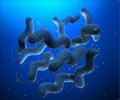Researchers say a new water purifier inspired by computer chip technology could save millions of lives.
Researchers say a new water purifier inspired by computer chip technology could save millions of lives.
Developed by scientists at the Massachusetts Institute of Technology, the new water purifier uses magnetic fields to separate harmful contaminants and produce clean water.Scaled up and mass produced, the new technology could reduce infections brought by water-borne contamination, potentially saving millions of lives.
"This can remove bacteria and other particles from seawater and brackish water without suffering any clogging issues. This won't be a big deal in the U.S. But in places like India, where the water is brackish and getting saltier, this could be important," Discovery News quoted Jongyoon Han, a scientist at MIT, as saying.
The new water purifier is small, about the size of a postage stamp.
Inspired by computer chip fabrication techniques, the MIT scientists made the chip from soft silicone, rather than hard silicon.
Except for a handful of Y-shaped dark slashes, the new device is also clear.
Advertisement
Any object that has a positive or negative charge, which includes everything from dissolved salt ions to entire bacteria, is pushed on way. Clean water, which does not have a charge to it, flows the other way.
Advertisement
During a recent test, the new purifier removed 99 percent of contaminants from a test mixture of North Atlantic seawater, blood, proteins and small plastic particles.
Because contaminants are pushed away from the membrane, instead of being drawn through the membrane, the device will not clog.
During the next two years, the MIT scientists plan to scale up their device with 16,000 channels squeezed onto an eight-inch wafer. It would use about 60 watts of electricity from a solar panel and could purify water as quickly as a Brita pitcher.
That's enough water for a small family, but it doesn't come close to the levels that commercial reverse osmosis desalination plants can purify, said Han.
But researchers hope that the new device, powered by a solar panel, purifying water in developing countries and reducing the number of deaths from water-borne diseases like cholera.
An article describing the device has been published in Nature Nanotechnology.
Source-ANI
RAS












